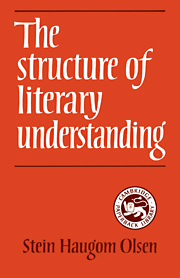Book contents
7 - THE EVALUATION OF LITERARY PRACTICE
Published online by Cambridge University Press: 30 September 2009
Summary
The sociological argument
Preciseness, coherence, relevance, complexity and interest are good-making features of a literary work and they constitute the basis on which a reader can order his literary priorities. They are the properties which make the literary work good of its kind, i.e. good as a literary work, and they play a role in judgements about the relative merit of single literary works. Judgements concerning these properties are part of literary practice; they constitute a part of the institution of literature and they could not be made if there were no literary practice. They are, in a sense, moves in the literary game for which there are institutional rules. However, these properties are of no use if the reader wants to step outside the institution of literature and try to place literature as an institution among the other concerns of mankind. To justify the institution one cannot fall back on a set of properties defined as good-making for the institution. These properties are in need of independent justification, to the same extent as the institution is.
The purpose of a discussion about the value of literary practice is to support by reasons the generally accepted view that literature is a great cultural good and a worthwhile activity. Though one cannot expect such a discussion to yield any very general and exact method for judging the many activities in which human beings engage, it must be expected to yield an argument or a combination of arguments which relieve the reader of the theoretical anxiety that literature is not worth spending his energies on.
- Type
- Chapter
- Information
- The Structure of Literary Understanding , pp. 199 - 223Publisher: Cambridge University PressPrint publication year: 1978



